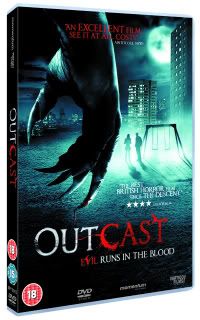FIND OUT MORE ABOUT OUTCAST ON DVD 17.01.2011
When British horror films work, it’s when they bring the terror right up to your doorstep. There’s a reason why horror movies started to really upset people in the late 60s. It’s because a new wave of independent directors started grounding horror in starker realities. While Zombies may not exist (and I know a lot of undead obsessives with escape plans who wish they did…), Night of the Living Dead brought these terrors to the bottom of the garden, unleashing fear cinema from the shackles of gothic castles, corseted wenches and Victoriana.
If you take that model and apply it to modern day Britain, using our film industries lower budgets to hone the story telling and focus it just beyond the audiences front doors, then logically, you’ve got a greater chance of twisting the viewers minds. As children, it’s not the real dangers of the outside world that frighten us, it’s the unnamed things that lurk under the bed and try to grab at your ankles if you don’t tuck the duvet round your feet that inspire the biggest shivers.
The British horror movies that really stick in the mind for me aren’t those that overreach themselves in an attempt to compete with flashier foreign films, it’s the movies that engage with surburbia, our countryside and our housing estates, refracting our immediate reality through a blood smeared lense.
‘Mum & Dad’ works because it takes the Torture-Porn blueprint and grounds it in a grim Suburban hellhole, where the everyday things of life, from the tabloid newspaper on the breakfast table to the drab clothes worn by the cast, sharpens the horror. In the same way that Eden Lake whispers to it’s middle class target audience that only streets away, Deliverence style inbreeding is creating an army of savage chavs, Mum & Dad suggests that your neighbour who rarely opens the curtains demands investigation.
In the 70s Pete Walker virtually created his own genre with a series of films that were forced by shoestring budgets to place their outlandish horror in the kind of houses familar to avid viewers of the decades Sit-Coms. Behind twitching curtains lurked psychotic priests and Middle-aged lady cannibals. Fashionable but wayward women attending humdrum cocktail parties might find themselves whisked away by handsome if creepy gents to secret, private and sexually perverse prisons for young girls.
Outstanding among British horror movies with a more realistic bent is The Wickerman and this is perhaps the best title to draw comparisons with the upcoming OUTCAST. Although OUTCAST is explicitly supernatural whilst The Wickerman makes no claim that the islanders have magical powers, both engage because they tap into both the idea of bringing horror close to home and of bringing ancient traditions, fully functioning and without compromise, into the modern era.
If you look around, it doesn’t take a long time to notice how much of our culture springs from earthy, pagan, Pre-Christian times. Yuletide logs and Mistletoe at Christmas, Morris Dancing, Corn Dollies and of course, the convienient timing of many important dates in the Christian calender all attest to an ancient and sometimes much darker history that we can all tap into.
In the Wickerman, an entire island, isolated but still part of the modern world, seem to be under the same mass delusion. Humanity is cast aside in favour of old gods and yet, the setting remains one you could reach by traveling out of town to a rural village. OUTCAST brings an ancient system of beliefs right into the heart of our urban enviroment. The monsters are very real and the bloodletting rituals feel alive and connected to our past, rather than being flashy exercises in ham acting.
The film works because is crashes the supernatural into the banal, questioning our faith in all the gadgets and comforts of modern life, because on a sinkhole estate near you, something ancient has moved into an anonymous flat…


